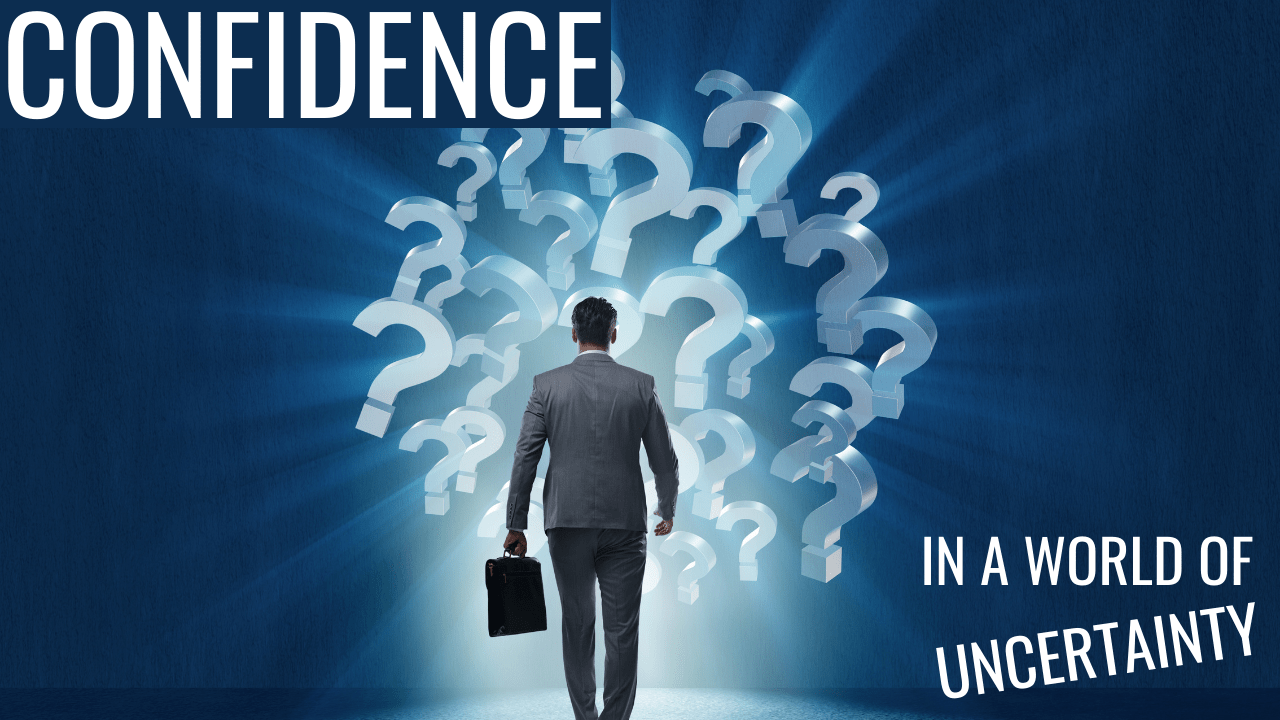Failure in a vacuum produces no fear. If we could fail in a world of no witnesses and no consequences, everyone would be much more daring. On the surface, you may argue that the real fear is bankruptcy. However, the real fear is of the aftermath of such an event which produces the lowest of low-vibe emotions: shame and guilt. When put into perspective, this fear can make us prudent and strategic but, when blown out of proportion, it introduces us to a world of insecurity, self-doubt, and excessive analysis which can be paralysing.
When our judgement is not clouded by fear, we have enough confidence and courage to explore our true passions and talents. We define our mission (higher purpose) and vision (specific goals). In turn, we gain further confidence and focus. It is a virtuous cycle that is profoundly motivational. Confidence, focus, and motivation are instrumental in differentiating between important information and noise. This translates into simplicity, clarity, and actionable choices. The importance of information is to regulate and channel impulse, not to stifle action. When we are driven by fear, information becomes the reason not to act – either we don’t have enough or we don’t know how to interpret the information we have. When we are driven by a clear mission and vision, the question defines the information required to proceed intelligently.
In times of crisis, we cannot look to the past or the future for answers. Productivity-sapping emotions such as anxiety, dread, self-doubt and distraction come from thinking too much about the past and future. Staying present, can help you approach difficult situations with composure and find solutions with confidence. Responsibility is the ability to accept and learn from both achievement and failure so you can continue to improve. By being honest with yourself and passionate about you do, you are much more likely to act responsibly. And by being responsible, you rid yourself of the crippling yoke of guilt and shame.
“Self-confidence is the first requisite to great undertakings.”
– Samuel Johnson
Leading Through Rolling Lockdowns
Admiral Jim Stockdale the highest-ranking POW of the Vietnam War spent eight years in the infamous “Hanoi Hilton.” He was routinely tortured and denied medical attention for the severely damaged leg he suffered during capture. During the course of his captivity, due to torture, his leg was broken twice. He walked with a limp until he passed away on July 5, 2005. Jim Collins shared Admiral Stockdale’s story of leading through uncertainty in Good to Great. “I never doubted – not only that I would get out – but also that I would prevail in the end and turn the experience into the defining event of my life, which, in retrospect, I would not trade,” explained Stockdale.
When asked who didn’t make it out, Stockdale replied, “Oh, that’s easy, the blind optimists. The ones who said, ‘We’re going to be out by Christmas.’ And Christmas would come, and Christmas would go. Then they’d say, ‘We’re going to be out by Easter.’ And Easter would come, and Easter would go. And then Thanksgiving, and then it would be Christmas again. And… they died of a broken heart.” Stockdale went on to say that, “You must never confuse faith that you will prevail in the end – which you can never afford to lose – with the discipline to confront the most brutal facts of your current reality, whatever they might be.”
“Get more confidence by doing things that excite and frighten you.”
– Jessica Williams
3 Leaderships Truths for Traumatic Times
Those who lead through traumatic times know that this is not a solitary journey for a heroic leader. They are conscious leaders who make space for others to also share their stories, grow and lead. They know that the healing, resilience, and growth potential following trauma will be much stronger when it is part and parcel of the collective consciousness. Great leaders create rituals that call teams, groups, and whole communities to acknowledge trauma, journey through the necessary healing, and develop together. These groups come out on the other side, stronger, wiser, and psychologically more prepared for future traumatic impacts. In the midst of all the downward spiral news and traumatic events that currently surround us, we invite you to anchor into possibility. In the places where you lead and it seems like you have insurmountable challenges and traumatic circumstances to overcome, ask yourself: What is a story from my life that signifies my purpose here? And once you have navigated through trauma, ask yourself, your teams, and your communities: What is possible now?
#1 You are going to be a better leader when this is over.
COVID has been an epic test of character and determination for millions of people all over the globe. Leaders have had to cope with extraordinary demands: for them, the pandemic has been the ultimate leadership test. Agility, patience, poise, and unwavering strength are all qualities displayed by conscious leaders in times of uncertainty. Coping with the overnight shutdown of the economy was hard enough; figuring out how to restart in such an uncertain and volatile environment is even harder. Leaders are expected to demonstrate empathy and, at the same time, be highly engaged with their teams, and fact-based in their actions. In a crisis, it can be easy for leaders to busy themselves with urgent meetings and operational issues. However, the tendency to keep yourself busy can also mask an underlying fear: it’s a way of showing you are in control just when you fear you may not be. To be truly effective, you need to be a leader who can look beyond the daily conflagrations. Think and plan further out, even as you put out the fires raging around you. The cohesion of your team during this time is absolutely critical and in times like these, we learn to trust each other more.
#2 False hope is destructive. Never lie to yourself or others.
In a crisis, what matters becomes very clear, very fast. Strategy, roles, personal ownership, external orientation, and leadership that is both supportive and demanding can all be seen much more clearly now. Acknowledge what you don’t know and avoid pretending you have all the answers. Once the crisis is over, everyone will remember how the leadership team acted during the pandemic. For all their expertise, leaders are grappling with many new questions for which they don’t have answers, even as their teams look to them for direction. A pandemic is a once-in-a-century event, and no training or experience in previous downturns has prepared leaders for anything of this magnitude. It is fine to admit that you sometimes feel powerless or unprepared for this uncertainty. It is important we face brutal realities. Every day in this crisis can seem like an eternity, yet the decisions you make now will shape your legacy as a company leader. Great leaders understand that while they might have a plan, they will also need to adapt it to these new realities – sometimes even tearing the plan up and starting from scratch.
#3. Optimism must be the conviction that you will prevail, not that the path forward is easy or certain.
When you’re in the middle of a crisis, it is all too easy to move into survival mode. Working through the latest issue comes at the expense of longer-term problems, which can wait until tomorrow. But the best leaders understand that this is short-sighted. The pandemic panic will one day go away. We will find a way to manage it the same way we do with other infectious diseases. Great leaders are taking the opportunity that a crisis offers to rethink how things have always been done – ensuring that the post-crisis world is better than the one that came before it. The moment is not to be lost: those who step up their game will be better off and far more ready to confront the challenges and opportunities of the next normal than those who do not.
Organisations are also showing a more profound appreciation for matching the right talent, regardless of hierarchy, to the most critical challenges. In an environment with strong cost pressures, successful leaders will see the value in continuing to simplify and streamline their organisational structures. Experience has shown a better way, with critical roles linked to value-creation opportunities and leadership roles that are much more fluid. New leaders are emerging from unexpected places: the premium is placed on character and results, rather than on expertise or experience. However, this can only work if the talent is there. To hire and keep top talent (the scarcest capital of all) means creating a unique work experience and committing to a renewed emphasis on talent development.
“When you have confidence, you can have a lot of fun.
And when you have fun, you can do amazing things.”
– Joe Namath
Confidently in SHAPE
We all feel more confident when our bodies are in shape. When it comes to recovering revenue after a crisis, speed matters. As the crisis abates, organisations will need to fundamentally rethink their revenue profile, position themselves for the long term, and to get ahead in the marketplace. To SHAPE up your organisation:
Start-up Mindset.
A startup mindset disregards “what could be.” It cares about “what is” and it acts on it now. It knows that things will most likely change. But it also knows that when they do, the only thing you’ll be able to look back at is what you did. Not what you should have done but didn’t because you were afraid. It’s a mindset of meritocracy. It’s not about hierarchy – it’s about whether you’re good or not and where you’re going, not where you’ve been. A start-up mindset means you are going to do what needs to be done to move beyond immediate challenges. A startup mindset means that you are on a mission, you’re not just simply trying to make a buck. The right balance is key. Action over research and testing over analysis. Agility and accountability are kings.
Human-Centric
Human-centric business strategies are now a must across all levels of an organisation to make sure employee and customer feelings, opinions and motivations are considered. Tomorrow’s top brands will be the most empathetic, focusing on a people-first approach to customer value and experiences. Organisations everywhere must now rethink all aspects of their operations – workplace culture comes first. A culture that is focused on empathy is a culture designed to bring out the best in its people. When employees are shown empathy and know that they’re truly heard and respected, they feel safe to creatively experiment and push boundaries to innovate.
Accelerating Digital
The transformation of any business, digital or otherwise, is done for one reason: optimisation. Why transform at all? To improve the human experience. To spend more time doing high-value things and to move humans up the value chain. By focusing on relevant, personalised and optimised interactions that allow for richer experiences, we can reduce the friction and noise that result from the “dumb systems” that result if digital transformation is left to fall short.
Purpose-Driven Customer Playbook
Companies need to understand what customers will value, post-COVID and develop new use cases and tailored experiences based on those insights. First and foremost, you need to have the right foundation in place. That foundation is your culture, and it must be developed as a customer-centric one. With a customer-centric culture, the customer is at the heart of everything the business does – hiring, firing, making decisions, developing policies and processes, and more. It’s a collaborative culture where data and information are shared across the organisation and everyone is involved in creating a great experience and ensuring customer success.
Ecosystems
Given crisis-related disruptions in supply chains and channels, adaptability is essential. That will mean changing the ecosystem and considering non-traditional collaborations with partners up and down the supply chain. Successful business ecosystems benefit everyone involved. By expanding products, services and capabilities through cooperation and collaboration, organisations can create solutions based on true customer needs, rather than system availability. Additionally, ecosystems allow organisations to broaden their reach into different markets.
“Confidence doesn’t come out of nowhere. It’s a result of something… hours and days and weeks and years of constant work and dedication.”
– Roger Staubach
Never Let a Good Crisis Go to Waste
The wisdom of Winston Churchill’s sentiment is as relevant today as it was then, reminding leaders to intentionally look for new possibilities in adverse situations they encounter. Where some might find despair or, find a reason to surrender, leaders who are adept at turning difficult situations into competitive advantages are able to equip their organisations with the endurance it takes to consistently win. Leading during times of crisis is as disorienting as it is illuminating. On one hand, a good crisis demands that leaders find and strengthen new leadership muscles they never knew they had. On the other hand, leading the way during a prolonged period of uncertainty and disruption reveals a leader’s character and capabilities, giving them boosted confidence and affirmation that they’ll be better prepared when faced with future difficulties that threaten the survival of their organisations. As you encounter your next leadership unexpected challenge, consider the following behaviours to help you lead your team to the other side:
- Values guide the way
During difficult or challenging times, our values bring much-needed clarity and perspective. They provide reliable and accurate guidance on the range of available options as potential pathways forward, given the circumstances. Organisational values are always helpful for leaders when they need to explain to their teams the rationale informing their decisions. Values will always be the most reliable and consistent voice in the room. It’s a leader’s job to give them a voice in the process of making the hard decisions that come with leading through a crisis.
- Plan to be spontaneous
You can’t predict or plan for a crisis. Be willing to put your current strategic plan on hold, or even scrap it altogether. The best strategic plan is one that is responsive to the reality of your operating environment. Only a small minority of organisations had a section of their strategic plan dedicated to the possibility of a worldwide pandemic. Yet, every leader found themselves standing in the middle of one. Because circumstances often change swiftly, the status quo is typically not the best response if leaders expect their organisations to make it through intact. This means the right information must be quickly gathered and assessed so that a near-term response can be formulated and then implemented. In times like these, getting comfortable with “good enough” is often the best posture vs. falling into the trap of wasting precious time handwringing and second guessing what should be done and when. A flexible mindset helps to improve leadership agility, which is needed when navigating uncertainty.
- People first
A crisis is always a defining moment for leaders. It hones their critical thinking skills, response time and ability to focus on exactly what needs to be done vs. those things that need to be paused. A leader’s actions and behaviours during a crisis shape how team members perceive them and the confidence they have (or don’t have) in them. Often a leader’s past performance during a crisis determines how willing their people will be to follow them through the next one. As leaders become clear on the path forward, it’s important for them to use an empathetic and fact-based communication approach to implementing their plan. Without their team’s support, even the best plans won’t go far before failing.
- Rise like a Phoenix
A crisis of any scale always brings with it the opportunity for leaders to learn and grow. But this can only happen when leaders make it a priority to reflect on what they are experiencing and how they are either reacting or responding to what’s taking place. Being willing to ask for feedback from a trusted circle of confidants provides helpful perspective for leaders to consider as they work to strengthen their effectiveness.
“Action is a great restorer and builder of confidence.
Inaction is not only the result, but the cause, of fear.”
– Norman Vincent Peale
Boost your Self-Confidence
Your brain is highly active and malleable, and positive thoughts about yourself create new neural connections that are strengthened every time you repeat them. The stronger the neural connection, the more it shapes what you believe to be true about what you can or cannot do. Your mindset then influences your thoughts, emotions, behaviour and, ultimately, your results. By acknowledging and celebrating yourself more often, you physically alter your brain to notice more evidence of your capabilities and success. You can program yourself to believe that you deserve good things and that you are capable of creating positive changes in your life. As you strengthen those beliefs, you can experience even more confidence, resilience and motivation.
Many of us tend to under-appreciate the “minor” things we do successfully every day because we more easily remember experiences that are accompanied by strong emotions, such as those times when we made a mistake or “failed” at something. We tend to be excellent self-critics, and those critical thoughts lead us to experience depleting emotions such as guilt and embarrassment. When you train yourself to acknowledge and celebrate your progress – no matter how small – you can change your inner dialogue, broaden your perspective and prime yourself to feel even more confident. So, give yourself permission to toot your own horn.
“Each time we face our fear, we gain strength, courage, and confidence in the doing.”
– Theodore Roosevelt
Beyond a Shadow of a Doubt
It can take some time to shift negative habitual thoughts through self-praise, however, it is well worth the effort. Our number one recommendation is to stay away from mainstream news programming – it can decay the strongest of minds over time. No matter your level of confidence, the past year and a half has been as traumatic as it has been tumultuous. We are all having to navigate new ground that continues to shift under our feet. There are more questions than answers, yet it’s important to keep asking questions and continue talking. The issues tend to be complex, emotional, and polarising and require new ways to lead and work… But, don’t be fooled! The rules of co-creation have not changed. In spite of the world being perpetually on edge and collective fear, with division and anger heightened, your manifestation is still a reflection of your personal vibration, and level of consciousness with which you are resonating.
Your personal relationship to the world around you is still a reflection of that vibration and our collective experience is still a unified expression of our collective frequency. In this way, one of the most proactive moves you can make right now is to embody and consciously hold the highest, individual frequency possible in order to assist the collective. And make your moves from there. Despite the divisive commentary, the conflicting beliefs and the sense of unspoken agendas – we are ONE. We are ALL in this together. And on some level this is ALL an expression of us each individually – every part of it. We are all the governments, we are all the protests, we are the possible agendas and every side of the equation. If we are to consciously influence the greater whole systemically, then we each must be the singular raindrop that creates the ripples which becomes a tsunami of change.
“Have confidence that if you have done a little thing well, you can do a bigger thing well too.”
– David Storey
YOU are a Sure Thing!
As much as world events cast the illusion that the external environment governs our reality – it’s still an illusion. As much as the current social climate may provoke us to externalise our frustrations and argue for our egoic opinions; as compelling as it all seems… On a quantum level the lore remains the same. In fact, now more than ever it is of vital importance to flex your spiritual muscle. Take the opportunity to dive deep into your personal work. When you do the work, you allow yourself to come from a place of empowerment rather than disempowerment. A place of hopefulness and trust rather than helplessness and fear. A place of acceptance and compassion rather than victim and abuser.
The opportunity here is high-altitude training for spiritual muscles. How much can we trust and surrender in the face of collective uncertainty and maintain alignment with the values, virtues and ideals most resonant with our Truth? How much can we feel through our triggers and then rise above them to an ultimate perspective of empowerment? Do your best every day to embody the frequency you wish to SEE in the world. Walk that talk. Talk that walk. As a leader, be very careful of pride disguised as power. Surrender the egoic juice you get from your position, so you can raise your frequency. Approach this transformational time with vigilance. If we could all do this it will be a huge step in the direction of opening to higher possibilities and potentially instigating more aligned positive change.
“Whatever we expect with confidence becomes our own self-fulfilling prophecy.”
– Brian Tracy






